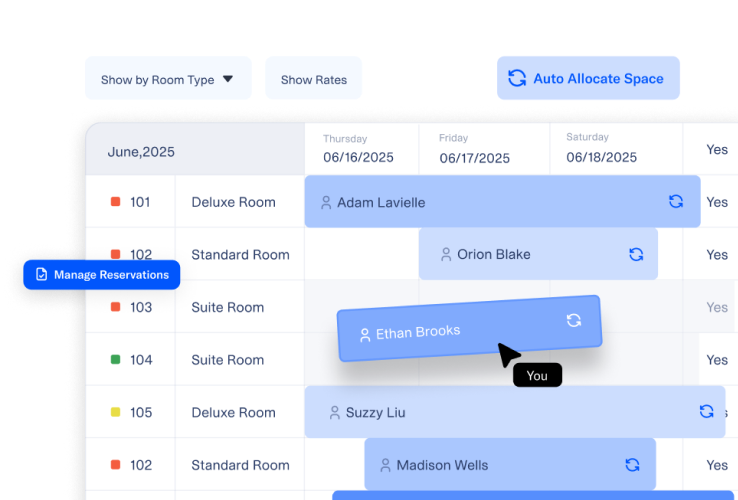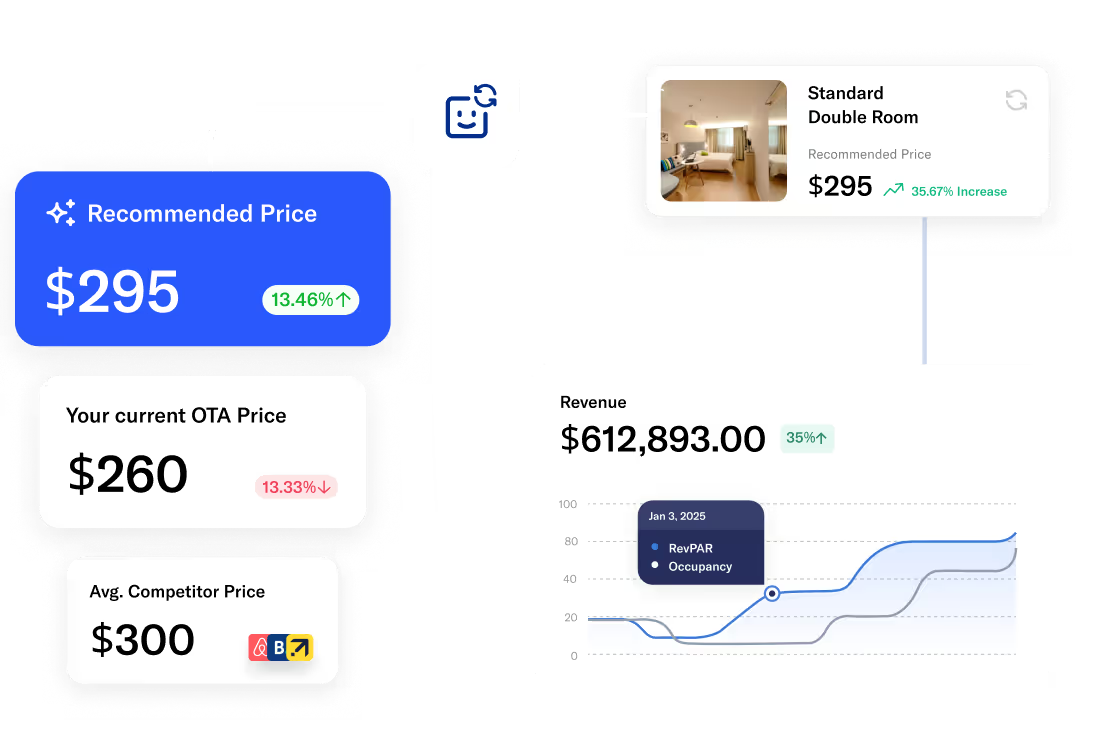Table of Contents
Join Thousands of Hotels Thriving with roommaster
The transition to roommaster is straightforward and efficient. Our implementation team handles data migration including reservations, guest profiles, and historical information.

The hospitality industry Australia is undergoing significant transformation as it moves toward 2030. With shifting traveller expectations, technological advancements, and as well as increasing competition. Hoteliers must stay ahead of these trends to remain profitable and as well as relevant.

The hotel industry in Australia has rebounded strongly from the pandemic, with tourism numbers climbing back to pre-2020 levels.
According to recent statistics:
This growth is driven by several key factors, including increased domestic travel, a resurgence in international tourism, and rising demand for luxury and boutique accommodations.
Additionally, major global events such as the 2032 Brisbane Olympics are already spurring new hotel developments, particularly in Queensland.
Cities are experiencing a wave of investments in both new builds and refurbishments to cater to the evolving traveler demographic.
However, despite these promising figures, hoteliers must navigate major challenges, including:
To maintain profitability and deliver superior guest experiences, hotels must invest in innovative technology, guest experience enhancements, and sustainability initiatives. Adopting a modern Hospitality Management Software is becoming essential, helping hotels streamline operations and reduce manual workload across departments.

Technology is rapidly transforming the guest experience and back-end operations in the hospitality sector. By 2030, smart hotels will be the industry standard, integrating AI, automation, and IoT (Internet of Things) to enhance both convenience and efficiency. Some of the most significant innovations include:
Investing in a cloud-based hotel property management system will be crucial for hoteliers looking to implement these changes efficiently.
Also, for more information about the impact of AI in hospitality, read: The Impact of AI on the Hospitality Industry.
{{pms-one}}
With travelers becoming more environmentally conscious, sustainability is no longer optional. Hotels that fail to adopt eco-friendly practices risk losing customers to competitors who prioritize green initiatives. By 2030, sustainability will be a key differentiator in the Australian hotel industry, with properties focusing on:
Hotels that embrace sustainable practices will reduce their environmental footprint while also attract eco-conscious travelers who are willing to pay a premium for green accommodations.
If you want to learn more about eco-friendly practices, check out The Future of Sustainable Hospitality or Sustainability Practices for Eco-Friendly Hotel Management.
As the Australian hotel industry grows, so does the demand for unique, high-end experiences. The definition of luxury shifts from opulence to authenticity, personalization, and sustainability. Key developments in this sector include:
The future of luxury hospitality lies in combining technology, sustainability, and deeply personalized service, ensuring guests receive memorable and exclusive experiences.
For more insights on market segmentation and tailoring your services to specific customer profiles, read: A Comprehensive Guide to Hotel Market Segmentation.
One of the most pressing issues for the Australian hospitality industry is the ongoing labor shortage. With fewer skilled workers entering the industry, hotels are struggling to maintain service standards and operational efficiency. By 2030, hoteliers will need to adopt new strategies to attract, retain, and develop talent. Solutions include:
Hotels that proactively address labor challenges will be better positioned to maintain high service levels and profitability in the coming years.
For more information about hotel operations and workforce challenges, read our blog: Everything You Need to Know About Hotel Operations Management

As the Australian hotel industry moves toward 2030, data-driven decision-making will become a necessity for maintaining profitability in an increasingly competitive market. Revenue managers will rely heavily on artificial intelligence (AI) and big data analytics to optimize pricing, forecast demand, and enhance guest personalization.
Key Advancements in AI and Big Data for Hotels:
Hotels investing in revenue management solutions will gain a significant edge, ensuring higher profitability and better guest experiences. Solutions like roommaster’s revenue management software help hoteliers stay ahead of market fluctuations and as well as automate pricing strategies.
To understand how dynamic pricing and data analytics can boost revenue, consider reading our blog about: Dynamic Pricing in Hospitality Industry.
{{revenue-management-one}}
Hospitality in Australia is adapting to technological and sustainability trends and reshaping its distribution channels, workforce management, and business models.
These shifts will define the sector’s competitiveness and as well as profitability in the coming years.
The pandemic reshaped guest expectations and booking behaviors, leading to a significant decline in consumer trust in Online Travel Agencies (OTAs). Travelers experienced difficulties with cancellations, refunds, and as well as lack of customer support, driving them toward direct bookings with hotels.
By 2030, direct bookings are projected to become the dominant reservation channel, reducing dependency on third-party platforms. To capitalize on this shift, hotels are:
Hotels with a good hotel channel manager will increase profit margins by reducing OTA commissions and will gain greater control over guest relationships.
For tips on driving direct bookings and reducing OTA dependency, see How to Increase Direct Bookings for Hotels.
Expedia’s travel trends indicate a growing interest in cultural tourism, with travellers seeking immersive experiences in history, arts, and local traditions.
Sydney ranks among the world’s top cultural destinations. This is signalling strong demand for heritage-driven travel experiences.
Hotels can leverage this trend by:
Hotels that successfully align with cultural tourism trends will attract high-value travelers looking for meaningful and immersive experiences.
The traditional hotel model is evolving as hotels diversify their revenue streams, tapping into new markets beyond lodging. By 2030, many properties will operate as multi-functional spaces, incorporating:
Furthermore, this diversification allows hotels to increase revenue resilience. Especially in a market that fluctuates due to seasonality and as well as economic downturns.
For more on diversifying revenue streams and innovative business models in hospitality, check out: Benefits of Yield Management in the Hotel Industry.
A: Growth is fueled by a post-pandemic tourism rebound, an expected 11 million international arrivals by 2027. Moreover, significant investments in new developments, and major events like the Brisbane Olympics boosting regional demand.
A: Australian hotels are increasingly leveraging AI, IoT, and cloud-based PMS solutions . This is to provide contactless check-ins, personalized guest experiences, and streamlined operations.
A: Many properties are investing in energy-efficient systems, such as solar panels and LED lighting, water conservation, waste reduction programs. Moreover, pursuing certifications like Green Star and EarthCheck to meet the demands of eco-conscious travelers.
A: Hotels are mitigating workforce challenges through comprehensive upskilling programs, flexible work arrangements, as well as improved compensation. Furthermore, also increase automation to maintain high service levels.
{{cta-strip}}


The transition to roommaster is straightforward and efficient. Our implementation team handles data migration including reservations, guest profiles, and historical information.
See how roommaster's unified platform can work for your property. Our team will walk you through features tailored to your specific needs and operations.